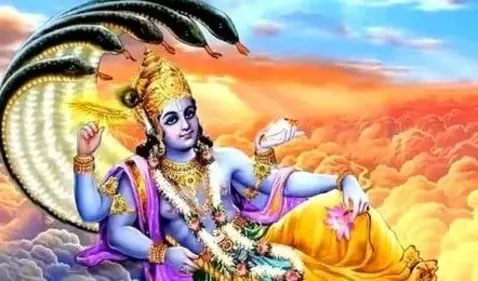
Pausha Putrada Ekadashi, falling in the Hindu month of Pausha (December-January), is a sacred day dedicated to Lord Vishnu. In 2025, this auspicious occasion will be observed on January 10th. Ekadashi, the eleventh day of the lunar fortnight, is revered for its spiritual significance, and Pausha Putrada Ekadashi is particularly associated with blessings for progeny and family well-being.
Significance of Pausha Putrada Ekadashi
The term “Putrada” translates to “giver of sons,” and this Ekadashi holds special importance for married couples desiring children. Observing this day with devotion is believed to bestow the blessings of Lord Vishnu, ensuring the happiness and prosperity of the family lineage. Additionally, it is a day to seek Lord Vishnu’s grace for spiritual growth, liberation from past sins, and overall well-being.
According to Hindu scriptures, observing a fast on Pausha Putrada Ekadashi is equivalent to performing numerous yajnas (ritual sacrifices). The fast cleanses the devotee’s mind and body, promoting a deeper connection with the divine and fostering spiritual discipline.
Rituals and Observances
Preparation (Dashami)
The observance begins on Dashami, the tenth day of the lunar fortnight. Devotees prepare themselves physically and mentally for the fast by consuming a simple meal before sunset. Foods such as grains, onions, and garlic are avoided to maintain sattvic (pure) energy levels. This preparatory stage signifies the devotee’s commitment to the vrata (vow).
Ekadashi Day
– Fasting: Fasting is the most important part of Ekadashi. Devotees abstain from grains, cereals, and certain vegetables. Depending on individual capacity, some observe a nirjala fast (without water), while others follow a partial fast, consuming only fruits, milk, and water. The fast symbolizes self-control and detachment from material cravings.
Prayer and Worship: The day begins with a ritual bath, symbolizing purification. Devotees set up an altar with an idol or image of Lord Vishnu, decorated with flowers and tulsi leaves. Offerings such as fruits, sweets, incense, and lamps are presented while chanting Vishnu’s mantras and hymns, including the “Vishnu Sahasranama” (a thousand names of Lord Vishnu). Special emphasis is placed on invoking Lord Vishnu’s blessings for family well-being.
Storytelling: Families gather to listen to the legend (vrat katha) associated with Pausha Putrada Ekadashi. The tale of King Suketuman and Queen Shaibya, who were blessed with a son after observing this vrat, is narrated. This tradition reinforces faith and highlights the transformative power of devotion.
Charity and Acts of Kindness: Devotees engage in acts of charity, such as donating food, clothes, and money to the underprivileged. Feeding Brahmins and offering assistance to those in need are considered highly meritorious deeds on this day.
Bhajans and Kirtans: Singing devotional songs and participating in community prayers create an atmosphere of spiritual upliftment. Such activities strengthen communal bonds and collective devotion.
Breaking the Fast (Dwadashi)
The fast is concluded on Dwadashi, the twelfth lunar day, after offering prayers to Lord Vishnu. Devotees break their fast by consuming a sattvic meal prepared without grains. The timing of breaking the fast, known as “Parana,” is determined based on the specific Ekadashi calendar for the region and must be observed within the prescribed window to maximize the spiritual benefits.
Legend of Pausha Putrada Ekadashi
The Bhavishya Purana narrates the story of King Suketuman and Queen Shaibya. Despite their prosperity and devotion, they were unhappy due to their childlessness. Distressed, King Suketuman wandered into a forest, where he encountered sages performing a yajna. They advised him to observe the Pausha Putrada Ekadashi vrat with faith and devotion. Following their guidance, the king and queen observed the fast and were soon blessed with a son who grew up to be a virtuous and capable ruler. This tale underscores the power of sincere devotion and the rewards of following dharma.
Astrological and Spiritual Relevance
Astrologically, Ekadashi days are considered potent for spiritual practices. The moon’s influence on the mind is believed to be at its peak, making it an ideal time for meditation, self-reflection, and detachment from worldly distractions. Pausha Putrada Ekadashi, in particular, aligns with the energies of Lord Vishnu, symbolizing preservation and harmony.
Cultural Practices Across Regions
While the core rituals remain consistent, the observance of Pausha Putrada Ekadashi varies slightly across different regions of India:
– North India: The focus is on prayers for family prosperity and progeny, with grand celebrations in Vishnu temples.
– South India: Devotees emphasize chanting Vishnu’s names and performing special archanas (ritual offerings).
– Eastern India**: Communities organize collective storytelling sessions and distribute prasad (sanctified food) to the poor.
Modern-Day Relevance
In today’s fast-paced world, Pausha Putrada Ekadashi serves as a reminder of the importance of family values, self-discipline, and spiritual connection. The practice of fasting not only benefits physical health but also fosters mental clarity and emotional stability. Acts of charity and kindness performed on this day resonate with contemporary ideals of social responsibility and compassion.
Tesla annual deliveries fall for first time as incentives fail to drum up demand
Looking Ahead 2025: Those aspiring to settle down in North America may keep their fingers crossed
Ratha Jatra, the Festival of Chariots of Lord Jagannatha is celebrated every year at Puri, the temple town in Orissa, on the east coast of India. The presiding deities of the main temple, Sri Mandira, Lord […]
The double slit experiment in physics accorded the photon the miraculous ability to be simultaneously present at two places. The monophotonic beam effecting interference was undeniable testimony to this impossible conclusion. Closer scrutiny of the […]
CONTINUED FROM PREVIOUS ISSUE How can one’s pre-ordained destiny be erased? It is written in accordance with the Lord’s Will. Without the Name of the Lord, no one can be saved. Through the Guru’s Teachings, […]
Your email address will not be published.
The Indian Panorama is an Indian American Weekly E-Newspaper published from New York for Indians, Americans, and NRI’s across the world available online.
© The Indian Panorama
Don’t miss out on all the happenings around the world
